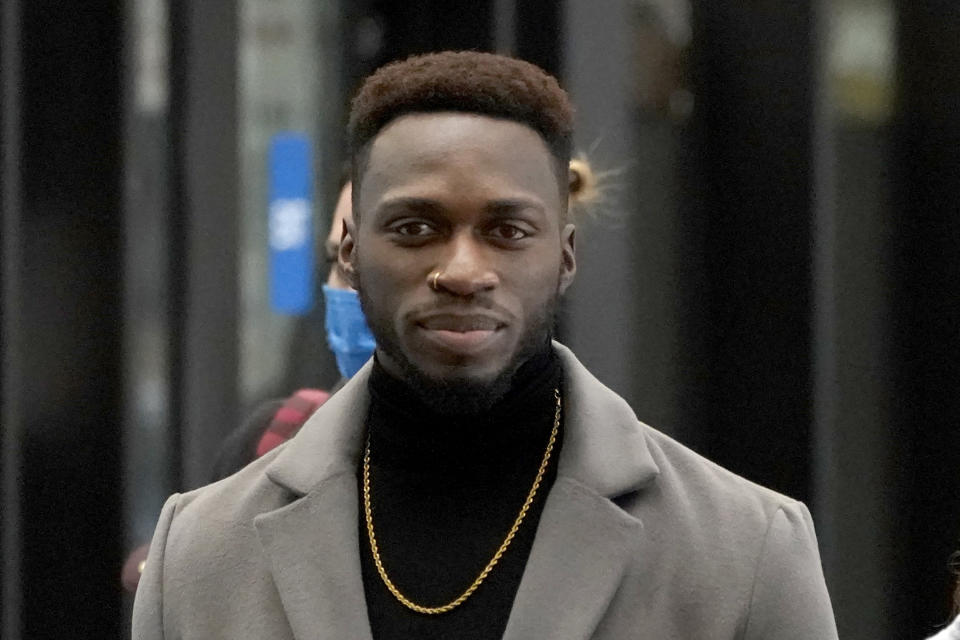Jussie Smollett testifies at criminal trial, details friendship with alleged attacker
- Oops!Something went wrong.Please try again later.
The actor Jussie Smollett took the stand Monday in his criminal trial for allegedly filing a false police report in 2019 — tied to an attack that prosecutors say he orchestrated for his personal benefit.
Smollett, 39, dressed in a blue suit and red tie, spoke as several family members and friends packed a front row of the courtroom in Chicago. The trial opened a week ago.
Smollett, 39, dressed in a blue suit and red tie, discussed his middle-class upbringing and how he broke into the entertainment industry before landing a starring role in the hit television series “Empire,” which premiered in 2015 on Fox.
Smollett, who spoke as several family members and friends packed a front row of the courtroom in Chicago, was then asked by his defense team about how he met Abimbola Osundairo, a background actor who worked on the “Empire” set.

Smollett said he met Osundairo, also known as Bon, at a club, and they struck up a friendship that included doing drugs, going to strip clubs and engaging in sexual activity.
“We went alone this time and got a private room and did drugs and masturbated together,” Smollett testified about one outing. He added that he had met Osundairo’s older brother, Olabinjo, but didn’t trust him, and Abimbola Osundairo began working as his trainer.
While legal experts say defendants are typically advised not to take the stand because they could provide inconsistent testimony, Smollett’s version of events may be necessary for the jury to understand the case’s confounding and twisting narrative. Defendants in recent weeks have also taken the stand in other high-profile trials, including Kyle Rittenhouse in Wisconsin; one of the men who pursued and killed Ahmaud Arbery in Georgia; and Theranos founder Elizabeth Holmes in California.
Smollett is being tried on six counts of felony disorderly conduct in Illinois after he was arrested for filing a false report to Chicago police about a month following the alleged attack on Jan. 29, 2019.
In the report, the former “Empire” star, who is Black and openly gay, said he was walking home from getting food in the early morning when he was assaulted by two masked men who hurled racist and homophobic slurs. Smollett also said his attackers poured what he believed was bleach over him and put a noose around his neck.
The actor told police he was on the phone with his manager during the incident, and the manager said he heard the attackers say, “This is MAGA country,” in reference to former President Donald Trump’s campaign slogan. The actor refused to hand over his cellphone to police, but later gave investigators a PDF file containing a limited list of his calls.
Last week, prosecutors at trial closed out their case by calling siblings Olabinjo and Abimbola Osundairo, who testified that Smollett hired them to stage an attack as a ploy for public attention and paid them with a $3,500 check.
Abimbola Osundairo, an aspiring actor, had worked as a stand-in on “Empire” and told the jury he agreed to help Smollett in the hoax because he felt “indebted” to his “close friend.”
The defense countered with theories that the brothers may have been taking advantage of Smollett for financial gain and were trying to scare him into believing he needed security, which they denied.
Smollett’s former music manager, Brandon Moore, also testified last week that when he was on the phone with Smollett that he “sounded panicked” and “out of breath.”
Smollett initially faced as many as 16 felony counts for allegedly filing a false police report before prosecutors dropped the charges in March 2019, a move blasted by then-Chicago Mayor Rahm Emanuel and then-Police Superintendent Eddie Johnson. A special prosecutor, however, secured another indictment last year.
In the aftermath of the incident, Smollett maintained his innocence and said he was upset that critics cast doubt over his claims that he was the victim of an alleged hate crime.
If convicted, Smollett could face up to three years in prison, although legal experts told The Associated Press that the prospect is unlikely given his lack of a criminal record and that no one was seriously hurt in the alleged attack. As an alternative to prison time, the judge could sentence Smollett to probation and community service.
Molly Roecker reported from Chicago and Erik Ortiz from New York.
This story first appeared on NBCNews.com.

